-
ORIGINAL ARTICLE12-04-2023
“Fala-M@no-COVID-19”: technological development of a health navigation program for men during the pandemic
Revista Brasileira de Enfermagem. 2023;76(6):e20220534
Abstract
ORIGINAL ARTICLE“Fala-M@no-COVID-19”: technological development of a health navigation program for men during the pandemic
Revista Brasileira de Enfermagem. 2023;76(6):e20220534
DOI 10.1590/0034-7167-2022-0534
Views0See moreABSTRACT
Objective:
to develop a care-educational technology similar to a health navigation program for men during the COVID-19 pandemic.
Methods:
a methodological and qualitative study of a care-educational technology of health navigation program, structured by Program Development Cycle, with 16 patient navigators and 10 professional navigators. It used reflective thematic content analysis and an adaptation model for data processing.
Results:
the ; navigation program was developed by: I) Observation of reality, problem mapping, needs assessment: content selection, creation of domains and questions; II) Theoretical-conceptual and methodological definition, creation of product under the elaboration of care plans, based on theory, process and taxonomies by a flowchart of operationalization of actions; and III) Self-assessment: qualitative research with professional navigators.
Final considerations:
the technology developed, with theoretical and methodological support, allowed to derive a viable navigation program compatible with reality based on the audience’s needs.
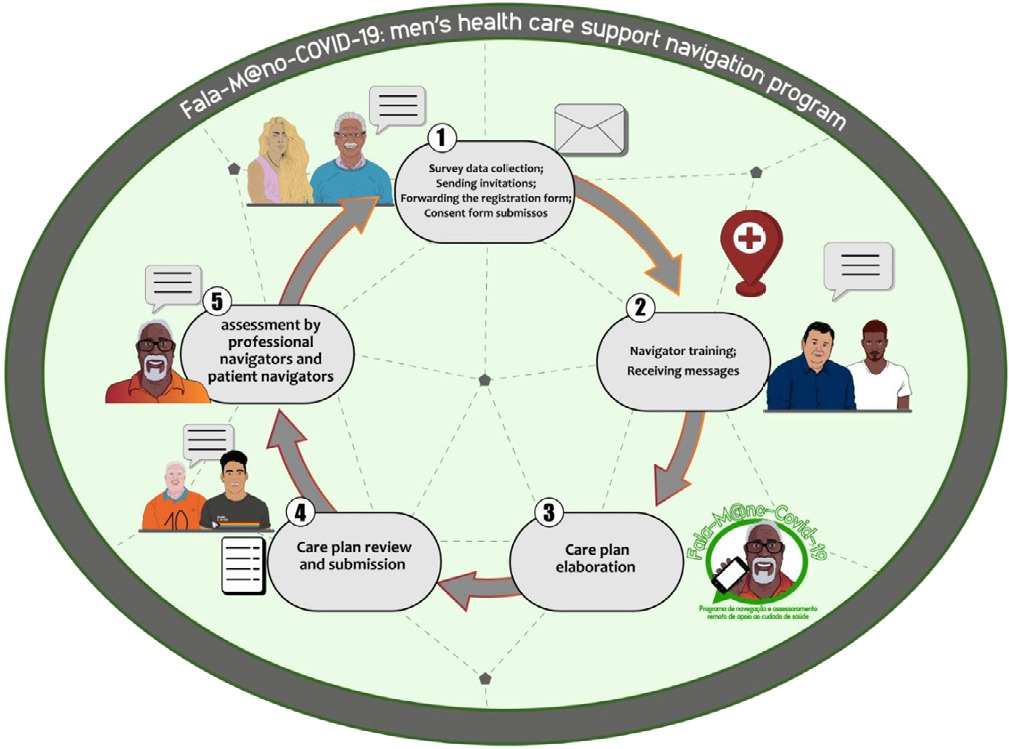
-
ORIGINAL ARTICLE12-04-2023
Social representation of young people in higher education about sexually transmitted infections
Revista Brasileira de Enfermagem. 2023;76(6):e20220406
Abstract
ORIGINAL ARTICLESocial representation of young people in higher education about sexually transmitted infections
Revista Brasileira de Enfermagem. 2023;76(6):e20220406
DOI 10.1590/0034-7167-2022-0406
Views0See moreABSTRACT
Objective:
to analyze the social representations about sexually transmitted infections elaborated by undergraduate students.
Methods:
a descriptive, qualitative study, in the light of the structural approach of Social Representation Theory, carried out with 160 young undergraduate students, in the second half of 2019, in the city of Rio de Janeiro. Data were collected using a sociodemographic characterization questionnaire, knowledge and practices for preventing sexually transmitted infections, analyzed using descriptive statistics and a form of free evocations with the inducing term STD, analyzed using prototypical and similarity analysis.
Results:
the representation’s possible central nucleus is composed of lexicons aids, disease and HIV; the peripheral system by syphilis, sex, condoms, gonorrhea, prevention, infection, carelessness, HPV, herpes, ignorance, treatment, fear, unprotected-sex and danger.
Final considerations:
social thinking about sexually transmitted infections is characterized by their recognition as diseases, which require barrier prevention measures, associating with unsafe sexual practices that arouse fear.

-
12-04-2023
The Medical Healing of Souls: a strategy for welcoming post-pandemic mental health
Revista Brasileira de Enfermagem. 2023;76(6):e20220331
Abstract
The Medical Healing of Souls: a strategy for welcoming post-pandemic mental health
Revista Brasileira de Enfermagem. 2023;76(6):e20220331
DOI 10.1590/0034-7167-2022-0331
Views0See moreABSTRACT
Objective:
to reflect on the applicability of the Medical Healing of Souls (MHS) by health professionals as a welcoming strategy in post-pandemic mental health.
Methods:
a theoretical and reflective study, based on Viktor Frankl’s philosophy, based on the book “The Doctor and the Soul, From Psychotherapy to Logotherapy” and scientific literature.
Results:
the study was structured in two discursive approaches: MHS in the field of health; The applicability of MHS in post-pandemic mental health care.
Final considerations:
MHS can be used in mental health care, in health emergencies, promoting a more humane performance of health professionals, facilitating the integration of inevitable suffering into a meaningful life.
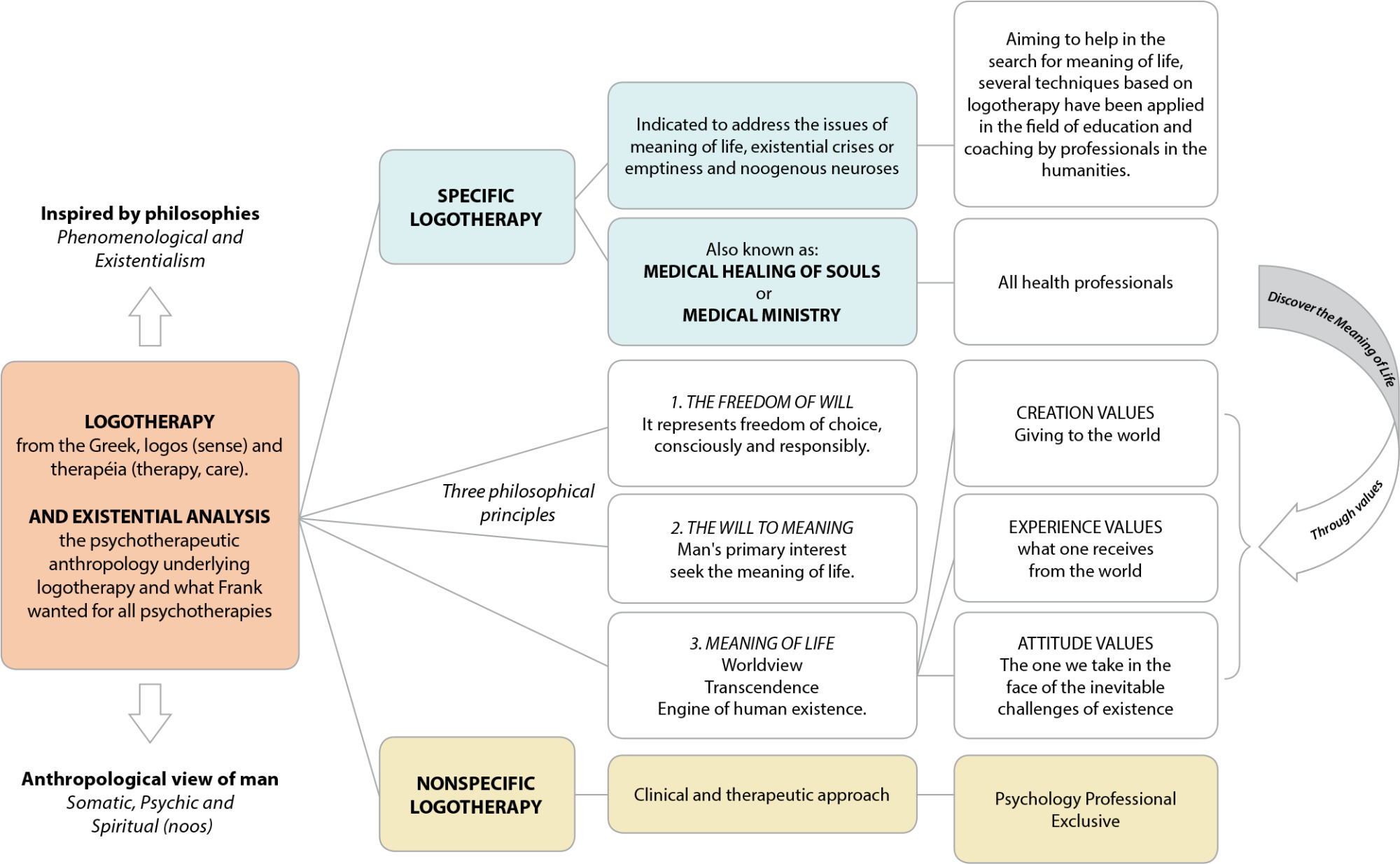
-
ORIGINAL ARTICLE12-04-2023
Translation, cross-cultural adaptation and validity study of the “Play Nicely Program: The Healthy Discipline Handbook” for use in Brazil
Revista Brasileira de Enfermagem. 2023;76(6):e20220281
Abstract
ORIGINAL ARTICLETranslation, cross-cultural adaptation and validity study of the “Play Nicely Program: The Healthy Discipline Handbook” for use in Brazil
Revista Brasileira de Enfermagem. 2023;76(6):e20220281
DOI 10.1590/0034-7167-2022-0281
Views0See moreABSTRACT
Objective:
to describe the translation, cross-cultural adaptation and validity process of the “Play Nicely Program: The Healthy Discipline Handbook” for use in Brazil.
Methods:
a methodological study that followed the translation, back-translation, expert committee assessment, and pre-test steps. The Content Validity Index (CVI) was calculated for both the judge population and the pre-test population. Four translators, seven expert judges in the field of child health and thirty participants in the pre-test, including parents, teachers and healthcare professionals, participated in the study.
Results:
in experts’ analysis (98.4%), a value of 100% of adequate assessments was obtained, and in the target population’s analysis (89.5%), there were 100% of adequate assessments. In both analyses, suggested adaptations were made.
Conclusios:
cross-cultural adaptation and content validity into Brazilian Portuguese of the “Play Nicely Program: The Healthy Discipline Handbook” were considered adequate for application in the target population.

-
ORIGINAL ARTICLE12-04-2023
Assessment of the components of sarcopenia and quality of life perceived of individuals on hemodialysis
Revista Brasileira de Enfermagem. 2023;76(6):e20220677
Abstract
ORIGINAL ARTICLEAssessment of the components of sarcopenia and quality of life perceived of individuals on hemodialysis
Revista Brasileira de Enfermagem. 2023;76(6):e20220677
DOI 10.1590/0034-7167-2022-0677
Views1See moreABSTRACT
Objectives:
to evaluate the prevalence of sarcopenia in individuals aged 50 years or older on hemodialysis; to verify the association between sarcopenia and sociodemographic, clinical, anthropometric factors, components of sarcopenia and quality of life (QoL); and to correlate the components of sarcopenia with QoL.
Methods:
Participated 83 individuals on hemodialysis. Sarcopenia was established according to the current European consensus. Dynamometry to determine strength, calf circumference (CC) and appendicular skeletal muscle mass index (ASMMI) to obtain muscle mass and gait speed (GS) for physical performance. For QoL used the WHOQOL-bref.
Results:
the prevalence of sarcopenia was 32.6% (CC) and 18.1% (ASMMI). There was no association between sarcopenia and QoL. Both handgrip strength (r=0.25) and GS (r=0.36) showed a correlation with physical domain.
Conclusions:
sarcopenia was expressive, and the aspects of functionality determine the physical impairment in this population.
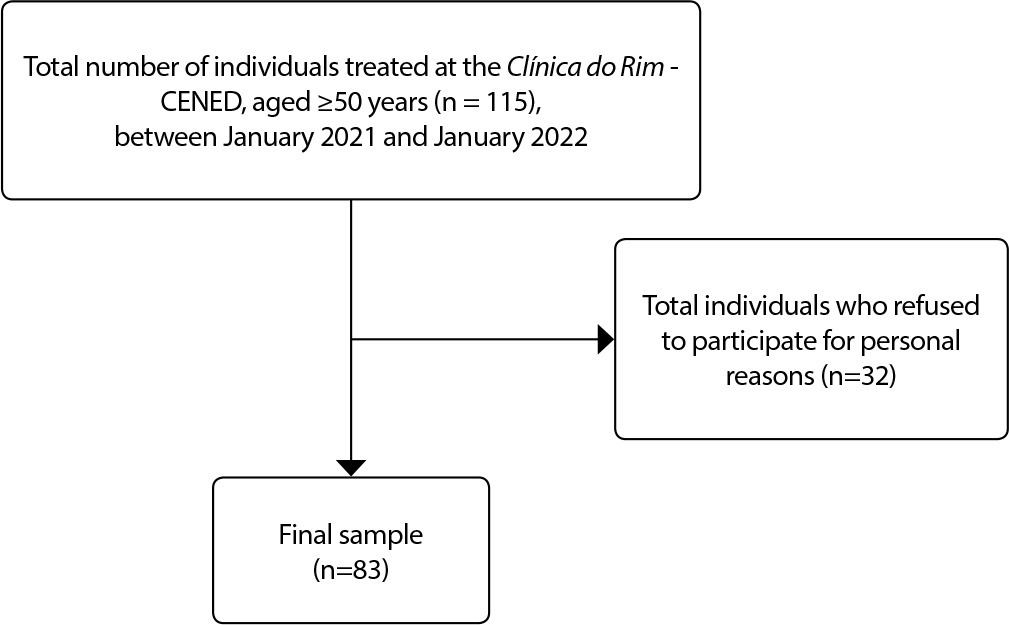
-
ORIGINAL ARTICLE12-04-2023
Effects of auriculotherapy on anxiety and biomarkers in Primary Health Care: a clinical trial
Revista Brasileira de Enfermagem. 2023;76(6):e20220728
Abstract
ORIGINAL ARTICLEEffects of auriculotherapy on anxiety and biomarkers in Primary Health Care: a clinical trial
Revista Brasileira de Enfermagem. 2023;76(6):e20220728
DOI 10.1590/0034-7167-2022-0728pt
Views0See moreABSTRACT
Objective:
to assess the effects of auriculotherapy on anxiety and brain-derived neurotrophic factor (BDNF), neuron-specific enolase (NSE) and S100 calcium-binding protein B (S100B) serum levels in adults assisted in Primary Health Care.
Methods:
a pre-experimental pilot clinical trial. Information was obtained from 19 patients using the State-Trait Anxiety Inventory (STAI) and analysis of BDNF, NSE and S100B serum levels.
Results:
the pre-intervention anxiety score in the IDATE-Trait was 52.11±6.691 (CV 12.84%) and the assessment after auriculotherapy was significantly lower (43.72±8.141; CV 18.62%; P=0.0007). S100B levels were significantly reduced after auriculotherapy (from 64.03±72.18 to 54.03±68.53 pg/mL; CV 126.8%; P=0.0023).
Conclusion:
auriculotherapy effectively reduced anxiety levels. It proved to be safe and easy to apply, allowing nurses to perform this technique autonomously. A reduction of S100B was also evidenced, demonstrating possible prevention of neuronal damage.
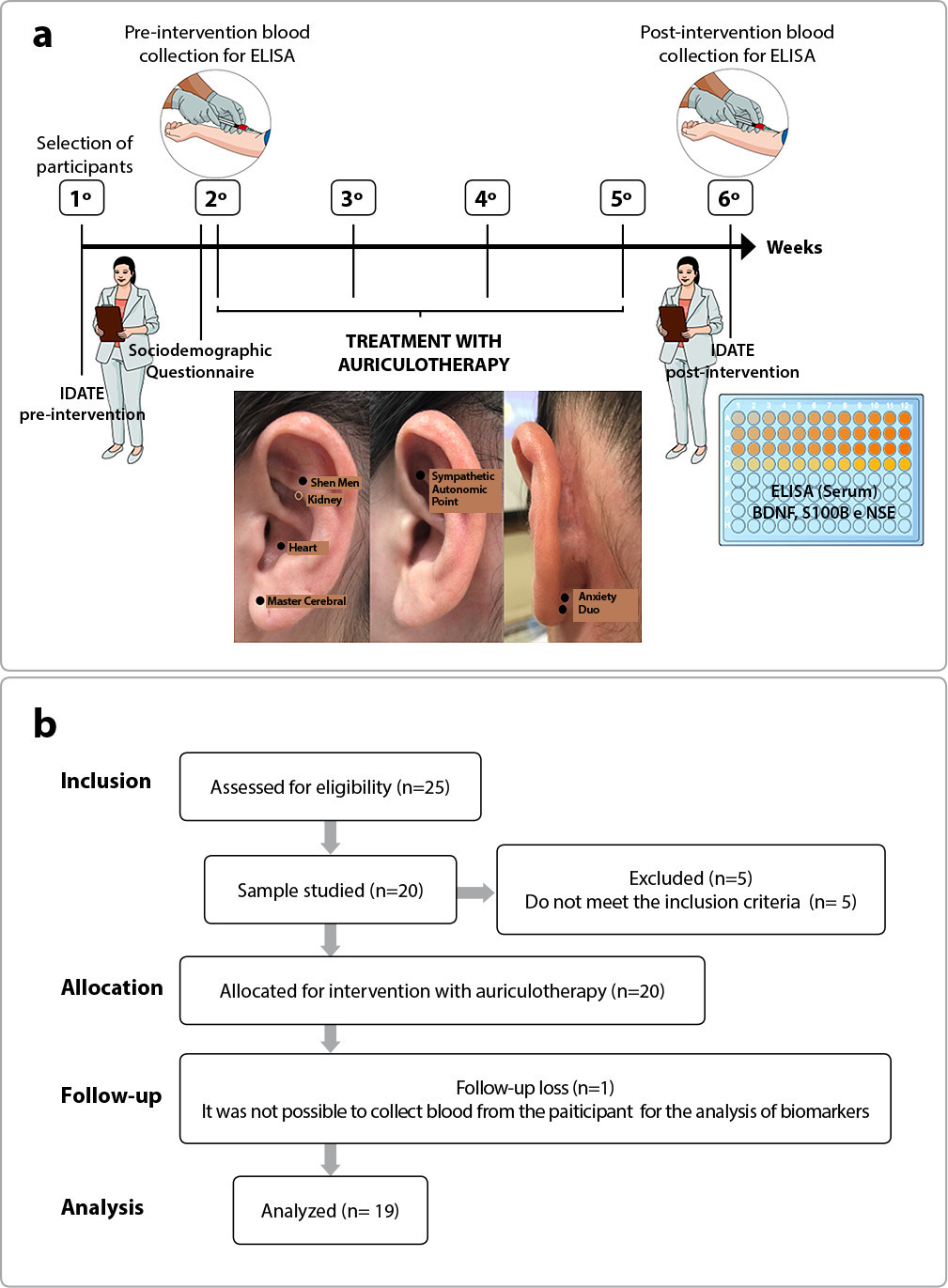
-
ORIGINAL ARTICLE12-04-2023
Leadership Competencies of the Medical-Surgical Nursing Specialist Nurse
Revista Brasileira de Enfermagem. 2023;76(6):e20220721
Abstract
ORIGINAL ARTICLELeadership Competencies of the Medical-Surgical Nursing Specialist Nurse
Revista Brasileira de Enfermagem. 2023;76(6):e20220721
DOI 10.1590/0034-7167-2022-0721
Views0See moreABSTRACT
Objective:
To identify the leadership competencies of Medical-Surgical Nursing Specialist Nurses.
Methods:
A quantitative, descriptive study using the Leadership Competencies Questionnaire. 311 Portuguese Medical-Surgical Nursing Specialist Nurses participated. Data analysis involved descriptive and inferential statistical analysis using the Statistical Package for Social Sciences (SPSS), version 22.0.
Results:
Study participants had an above-average self-perception on the scale (mean = 3.5) in all leadership roles, recognizing their leadership competencies. The leadership competencies of Medical-Surgical Nursing Specialist Nurses are balanced across all roles: Mentor (5.80 ± 1.02); Coordinator (5.53 ± 0.86); Facilitator (5.38 ± 1.04); Innovator (5.34 ± 0.88); Director (5.31 ± 1.10); Producer (5.30 ± 0.98); Monitor (5.15 ± 1.00); Corrector (4.79 ± 1.29)
Conclusions:
Specialized nursing practice enhances nurses’ self-perceived leadership competencies. Nurses see themselves as leaders focused on internal support and facilitation of collective effort and opportunities for skill development.
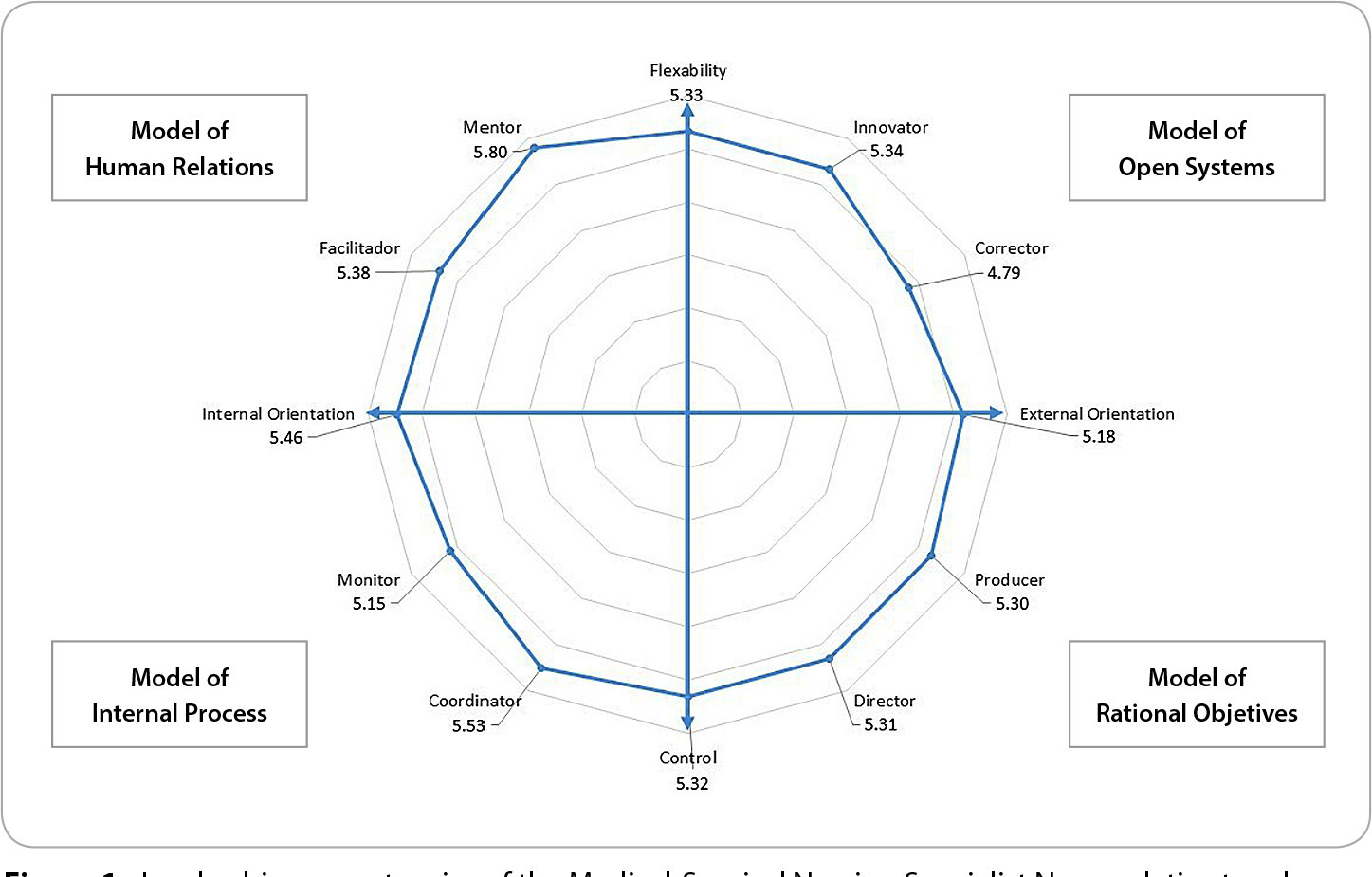
-
ORIGINAL ARTICLE12-04-2023
Feelings about birth by a group of high-risk pregnant women
Revista Brasileira de Enfermagem. 2023;76(6):e20230059
Abstract
ORIGINAL ARTICLEFeelings about birth by a group of high-risk pregnant women
Revista Brasileira de Enfermagem. 2023;76(6):e20230059
DOI 10.1590/0034-7167-2023-0059
Views0See moreABSTRACT
Objective:
to understand feelings about birth among a group of high-risk pregnant women.
Method:
a descriptive and qualitative study, using Alfred Schütz’s social phenomenology as a philosophical theoretical framework. The study included 25 pregnant women undergoing high-risk prenatal care. The interview had the following guiding questions: tell me about your feelings regarding the moment of birth/childbirth; How do you deal with the high-risk diagnosis? What are your expectations for birth/childbirth?
Results:
five categories emerged: Fear of obstetric care; Fear of complications with the baby; Fear of cesarean section; Resilience in the face of high-risk pregnancy; and Expectations for birth.
Considerations:
high-risk pregnant women are afraid of the care they will receive, the risks and concern about the baby’s vitality at birth. The importance of care is emphasized, with a welcoming environment, bonding and communication between health team and pregnant woman.
-
ORIGINAL ARTICLE09-09-2022
Palliative care management by caregivers in home care: theoretical validation in a conversation circle
Revista Brasileira de Enfermagem. 2022;75(6):e20210737
Abstract
ORIGINAL ARTICLEPalliative care management by caregivers in home care: theoretical validation in a conversation circle
Revista Brasileira de Enfermagem. 2022;75(6):e20210737
DOI 10.1590/0034-7167-2021-0737
Views0See moreABSTRACT
Objectives:
to present the validation process of a Grounded Theory on the management of palliative care at home by a caregiver of a family member who experiences a death/dying process.
Methods:
a qualitative, explanatory research, which validated a theoretical matrix through a conversation circle containing 15 family caregivers and nine healthcare professionals, in December 2018.
Results:
forty-six propositions were validated regarding family caregivers’ contextual, causal, intervening conditions, consequences and action strategies to deal with the dying and death process of a family member. Conversation circles encouraged dialogue and (re)signification of the senses and knowledge of those involved, proving to be a way of educating and promoting the exercise of citizenship by participants.
Final Considerations:
the conversation circle made it possible for participants to interact and share information and experiences regarding home care for palliative patients and their families.

-
EXPERIENCE REPORT06-24-2022
Step-by-step approach to reopening a Brazilian higher education institution during the COVID-19 pandemic
Revista Brasileira de Enfermagem. 2022;75(6):e20210807
Abstract
EXPERIENCE REPORTStep-by-step approach to reopening a Brazilian higher education institution during the COVID-19 pandemic
Revista Brasileira de Enfermagem. 2022;75(6):e20210807
DOI 10.1590/0034-7167-2021-0807
Views0See moreABSTRACT
Objectives:
to describe the experience of reopening a Brazilian higher education institution during the COVID-19 pandemic.
Methods:
experience report of a step-by-set approach to reopening a nursing higher education institution in São Paulo, Brazil, from May 2020 to May 2021.
Results:
the plan was created and operated by a group including students, professors, and technical-administrative workers. Weekly or by-weekly meetings occurred according to changes in the epidemiological situation and the needs to review the local technical and political agreements.
Conclusions:
we suggest that reopening plans during the COVID-19 pandemic should be politically and technically legitimated by all members of the community of a higher education institution so that they can take place quickly and sustainably. The early identification of COVID-19 cases and the adoption of local administrative measures are necessary to reduce the risk of outbreaks.

-
ORIGINAL ARTICLE10-03-2022
Instrument validity: HIV and other sexually transmitted infections in homeless people
Revista Brasileira de Enfermagem. 2022;75(6):e20210863
Abstract
ORIGINAL ARTICLEInstrument validity: HIV and other sexually transmitted infections in homeless people
Revista Brasileira de Enfermagem. 2022;75(6):e20210863
DOI 10.1590/0034-7167-2021-0863
Views0See moreABSTRACT
Objectives:
to validate, through the Item Response Theory, an instrument on vulnerability to HIV and other sexually transmitted infections in homeless people.
Methods:
a cross-sectional study carried out between February and May 2018 with 100 homeless people in a municipality in northeastern Brazil. A sociodemographic questionnaire was applied, and another with items referring to behaviors vulnerable to HIV and sexually transmitted infections (STIs). Subsequently, it was assessed through the Item Response Theory.
Results:
the items previous diagnosis of STIs (F=0.473), partner with STI symptoms (F=0.518), drug use (F=0.509), sex for money (F=0.552), STI symptoms (F=0.448), number of sexual partners (F=0.616), sharps sharing (F=0.398) and being a victim of sexual violence (F=0.347) were validated.
Conclusions:
the instrument proved to be validated, being able to identify vulnerability to HIV and other sexually transmitted infections in homeless people.

-
ORIGINAL ARTICLE08-22-2022
Temporal trend of accidents due to percutaneous exposure in a public hospital in Brazil, 2007-2019
Revista Brasileira de Enfermagem. 2022;75(6):e20220046
Abstract
ORIGINAL ARTICLETemporal trend of accidents due to percutaneous exposure in a public hospital in Brazil, 2007-2019
Revista Brasileira de Enfermagem. 2022;75(6):e20220046
DOI 10.1590/0034-7167-2022-0046
Views0See moreABSTRACT
Objectives:
to analyze the temporal trend of accidents due to percutaneous exposure in a public hospital in Brazil, between 2007 and 2019, according to sociodemographic and professional characteristics.
Methods:
analysis of time series of accidents due to percutaneous exposure that occurred in health workers. Sociodemographic and professional variables, accident profile, post-accident behavior and accident incidence rates were evaluated. The Prais Winsten regression was used for trend analysis and calculation of the annual percentage change, with a significance level of 5%.
Results:
761 occupational accidents were recorded. There was a downward trend in the rate of percutaneous injuries among female workers (-0.012%; p=0.009), who had secondary education (-0.011%; p=0.035) and among all health professional categories (-0.010%; p =0.019). There was an increasing trend (0.018%; p= 0.050) among workers with ≥ 61 months of professional experience.
Conclusions:
the analysis showed a decreasing incidence of percutaneous accidents, which can be explained by multiple factors.

-
ORIGINAL ARTICLE11-26-2022
Health beliefs and adherence of the elderly to fall prevention measures: a quasi-experimental study
Revista Brasileira de Enfermagem. 2022;75:e20201190
Abstract
ORIGINAL ARTICLEHealth beliefs and adherence of the elderly to fall prevention measures: a quasi-experimental study
Revista Brasileira de Enfermagem. 2022;75:e20201190
DOI 10.1590/0034-7167-2020-1190
Views0See moreABSTRACT
Objective:
To evaluate the effect of an educational intervention on health beliefs and adherence of elderly people to fall prevention measures.
Methods:
This is a quasi-experimental study, carried out at the Senior Citizens’ Center. Sixty-eight elderly completed the intervention. The intervention consisted of four meetings focused on beliefs about falls and prevention, and the evaluation occurred at baseline and 30 days after completion.
Results:
The elderly were predominantly women (83.82%), with one to four years of schooling (36.76%), with health problems (95.59%), and 48.53% had fallen. There was a significant increase in perceived susceptibility, severity, benefits, barriers, and total health belief score post educational intervention. By adding total to partial adherence, there was a significant increase in the adherence of the elderly to fall prevention measures after the educational intervention.
Conclusion:
Educational intervention was able to improve the beliefs and adherence of the elderly to fall prevention measures.
-
ORIGINAL ARTICLE11-26-2022
Transitional care of nurses to older adults with artificial pacemaker
Revista Brasileira de Enfermagem. 2022;75:e20210192
Abstract
ORIGINAL ARTICLETransitional care of nurses to older adults with artificial pacemaker
Revista Brasileira de Enfermagem. 2022;75:e20210192
DOI 10.1590/0034-7167-2021-0192
Views0See moreABSTRACT
Objective:
to understand how the transitional care of nurses to olde adults with artificial pacemaker occurs.
Method:
a qualitative research, carried out in a philanthropic hospital in the city of Salvador, Bahia, Brazil. Fourteen nurses working in surgical and cardiac inpatient units participated. Data were collected between August and November 2020, through semi-structured interviews, and analyzed using the methodological framework Discourse of the Collective Subject and discussed in the light of Afaf Meleis’ theory of transitions.
Results:
nurses’ incipient knowledge about transitional care was identified. It was observed that the nursing discharge report is a facilitating instrument for transitional care.
Final considerations:
the study pointed out that the transitional care of nurses to older adults with artificial pacemakers does not have a theoretical foundation, reporting as a priority the care with the pacemaker identification card and with the surgical wound.
-
REVIEW02-25-2022
COVID-19 and the occupational stress experienced by health professionals in the hospital context: integrative review
Revista Brasileira de Enfermagem. 2022;75:e20200859
Abstract
REVIEWCOVID-19 and the occupational stress experienced by health professionals in the hospital context: integrative review
Revista Brasileira de Enfermagem. 2022;75:e20200859
DOI 10.1590/0034-7167-2020-0859
Views1See moreABSTRACT
Objective:
To analyze Brazilian and international scientific publications about the stress experienced by health professionals in the hospital context during the COVID-19 pandemic.
Methods:
Integrative literature review carried out on the SciELO, ScienceDirect, and LILACS databases, and sources of official Brazilian institutions, with documents published by May 2020.
Results:
Of the 26 selected references, 19 (73.08%) were indexed articles, and 7 (26.92 %) were obtained from official institutions. The study found that stress is mainly due to the overload of hospital services, the removal of professionals, the insufficiency of personal protective equipment and strict biosecurity measures, challenges in the allocation of available resources, and the risk of contamination by COVID-19.
Final considerations:
The stress experienced by health professionals in hospital institutions during the pandemic can trigger occupational and psychological problems.

-
ORIGINAL ARTICLE09-29-2022
Neither angels nor heroes: nurse speeches during the COVID-19 pandemic from a Foucauldian perspective
Revista Brasileira de Enfermagem. 2022;75:e20201329
Abstract
ORIGINAL ARTICLENeither angels nor heroes: nurse speeches during the COVID-19 pandemic from a Foucauldian perspective
Revista Brasileira de Enfermagem. 2022;75:e20201329
DOI 10.1590/0034-7167-2020-1329
Views1See moreABSTRACT
Objective:
to analyze the processes of meaning production, based on the speeches of nursing professionals, about how they feel about the titles of “angels and heroes” given by society during the pandemic of COVID-19.
Methods:
a qualitative, documentary research. Data was collected in October and November 2020 and analyzed from the perspective of the Discourse Analysis proposed by Michel Foucault.
Results:
they were organized into two thematic categories: “Angels and heroes? The (not) heroic reality of nursing during the pandemic” and “The search for recognition of the professional work of nursing: between what is said and what is not said”.
Final considerations:
the nurses’ speeches enunciate the search for decent conditions for the execution of care, fair wages, and recognition of the professional work by society.
-
ORIGINAL ARTICLE02-10-2020
Group Brief Intervention: effectiveness in motivation to change alcohol intake
Revista Brasileira de Enfermagem. 2020;73(1):e20180138
Abstract
ORIGINAL ARTICLEGroup Brief Intervention: effectiveness in motivation to change alcohol intake
Revista Brasileira de Enfermagem. 2020;73(1):e20180138
DOI 10.1590/0034-7167-2018-0138
Views0See moreABSTRACT
Objective:
To verify the effectiveness of the group brief intervention (GBI), performed by nurses in motivational stages to change the pattern of alcohol intake.
Method:
Randomized controlled trial with 3-month follow-up. The ruler of readiness for change was applied in 180 individuals with risk or harmful alcohol intake pattern in basic health unit. Only the experimental group (EG) was submitted to the intervention. Both groups (experimental and control [CG]) participated in the follow-up.
Results:
EG had a mean score before GBI=6.55 (SD=3.41) points (preparation). After GBI=8.00 (SD=2.88) points (action) and in the follow-up 7.92 (SD=3.06) points (action). CG presented a mean score before GBI=5.42 (SD=3.26) points (preparation); after GBI=6.67 (SD=3.05) points (preparation) and in the follow up had a mean score of 4.80 (SD=2.86) points (contemplation). There was a statistically significant difference between the two groups at the motivational stages (p≤ 0,03).
Conclusion:
It was evidenced that GBI was effective in increasing the motivation to change harmful alcohol intake.

-
EXPERIENCE REPORT11-13-2020
Pedagogical mediations for non-formal nursing teaching during the COVID-19 pandemic
Revista Brasileira de Enfermagem. 2020;73:e20200499
Abstract
EXPERIENCE REPORTPedagogical mediations for non-formal nursing teaching during the COVID-19 pandemic
Revista Brasileira de Enfermagem. 2020;73:e20200499
DOI 10.1590/0034-7167-2020-0499
Views0See moreABSTRACT
Objective:
to report the experience of developing pedagogical mediations in a Virtual Learning Environment implemented in a nursing faculty during the COVID-19 pandemic.
Methods:
an experience report on the construction of a distance course aimed at graduates and residents of a nursing faculty at a public university located in the city of Rio de Janeiro.
Results:
the course’s conception, operationalization and implementation were the result of a collective work that culminated in a non-formal, virtual and problematic teaching process, which reached a participation rate of 82% of enrolled students.
Final considerations:
even in times of social isolation, the course promoted collaborative learning of knowledge about COVID-19 and strengthened the relationship between professors and students. The possibility of carrying out distance activities based on solid methodological proposals that contradict the content logic often observed in distance learning is emphasized.

-
EXPERIENCE REPORT02-05-2021
Paulo Freire’s culture circles: contributions to nursing research, teaching, and professional practice
Revista Brasileira de Enfermagem. 2021;74(1):e20190626
Abstract
EXPERIENCE REPORTPaulo Freire’s culture circles: contributions to nursing research, teaching, and professional practice
Revista Brasileira de Enfermagem. 2021;74(1):e20190626
DOI 10.1590/0034-7167-2019-0626
Views0See moreABSTRACT
Objectives:
to share the contributions of culture circles for teaching, research, and professional nursing practice, having as framework Paulo Freire’s Research Itinerary.
Methods:
this is an experience report of a culture circle, with participation of three professors and ten students, enrolled in a course of a Graduate Program in Nursing in southern Brazil. In this culture circle, a tree was built in which the roots formed the thematic investigation, the stem, coding and decoding, and the leaves, the Research Itinerary critical unveiling.
Results:
participants demonstrated empowerment of Paulo Freire’s assumptions, and building a tree made it possible to discuss in a pleasant and playful way culture circle use in teaching, research, and professional nursing practice.
Final Considerations:
the culture circle promoted reflection and action on nursing praxis, turning Freirean thoughts into something concrete and transforming realities.

-
ORIGINAL ARTICLE05-24-2021
Critical thinking in nursing training: evaluation in the area of competence Education in Health
Revista Brasileira de Enfermagem. 2021;74:e20200979
Abstract
ORIGINAL ARTICLECritical thinking in nursing training: evaluation in the area of competence Education in Health
Revista Brasileira de Enfermagem. 2021;74:e20200979
DOI 10.1590/0034-7167-2020-0979
Views0See moreABSTRACT
Objective:
To analyze the constitution of critical thinking in nursing training in the approach by competence and the integrated curriculum, considering the evaluation process by capturing its challenges, and proposing overcoming strategies.
Methods:
Qualitative. In the first phase of data collection, interviews were conducted with twenty-four professors, nine preceptors, and fifteen students to reconstruct the profile of competence, and in the second phase, a workshop to validate the profile identified challenges and proposals. The Collective Subject Discourse was used to analyze the interviews and the holistic competence reference in reconstructing the profile.
Results:
The critical thinking is built based on experiences in the world of work, and evaluation is the conductor of reflections towards emancipation.
Final considerations:
It signals the importance of professor training in the learning evaluation and working with the collective construction of subjects to overcome challenges that happen in the changes of training.
-
ORIGINAL ARTICLE03-09-2020
Assessment of premature mortality for noncommunicable diseases
Revista Brasileira de Enfermagem. 2020;73(2):e20180440
Abstract
ORIGINAL ARTICLEAssessment of premature mortality for noncommunicable diseases
Revista Brasileira de Enfermagem. 2020;73(2):e20180440
DOI 10.1590/0034-7167-2018-0440
Views0See moreABSTRACT
Objectives:
to analyze premature mortality and Potential Years of Life Lost by noncommunicable diseases in a city in the countryside of São Paulo from 2010 to 2014.
Methods:
ecological study of temporal tendency, using secondary source. For analysis, the premature mortality coefficient and the Potential Years of Life Lost indicator were used.
Results:
males had the highest premature mortality rate due to cardiovascular disease, with 213.04 deaths per 100 thousand inhabitants, followed by neoplasms, with 188.44. In women, there was an inversion with 134.22 deaths from cancer and 110.71 deaths from cardiovascular disease. Regarding Potential Years of Life Lost, males had an average of 12.19 years lost by death and females of 13.45 years lost.
Conclusions:
the results reinforce the need to increase public health prevention and promotion policies to reduce premature deaths, especially among men.
-
REFLECTION10-19-2020
Contributions of Florence Nightingale as a social entrepreneur: from modern to contemporary nursing
Revista Brasileira de Enfermagem. 2020;73:e20200064
Abstract
REFLECTIONContributions of Florence Nightingale as a social entrepreneur: from modern to contemporary nursing
Revista Brasileira de Enfermagem. 2020;73:e20200064
DOI 10.1590/0034-7167-2020-0064
Views0See moreABSTRACT
Objective:
To reflect on the transformations of modern and contemporary nursing as well as on Florence Nightingale’s social entrepreneurship.
Method:
This is a logical-reflective exhibition, with an emphasis on the theoretical assumptions of social entrepreneurship and the legacy of Florence Nightingale, from modern to contemporary nursing, based on readings of texts extracted from electronic databases, especially periodicals, books and theses.
Results:
The logical-reflective exhibition focuses on two fundamental aspects: 1) Florence Nightingale’s legacy as a social entrepreneur; 2) The evolution of Brazilian nursing: from modernity to contemporaneity.
Final considerations:
Florence Nightingale’s legacy is undeniable with regard to the evolution of modern and contemporary nursing and transcends different areas of knowledge. In addition to being a precursor to modern nursing, it is distinguished by its visionary attitude, humanitarian social value and potential for transforming the paths and realities present in the Contemporary Era.
-
ORIGINAL ARTICLE06-14-2021
Mothers’ knowledge of premature newborn care and application of Kangaroo Mother Care at home
Revista Brasileira de Enfermagem. 2021;74(6):e20200717
Abstract
ORIGINAL ARTICLEMothers’ knowledge of premature newborn care and application of Kangaroo Mother Care at home
Revista Brasileira de Enfermagem. 2021;74(6):e20200717
DOI 10.1590/0034-7167-2020-0717
Views0See moreABSTRACT
Objective:
to identify mothers’ knowledge about premature newborn care and application of Kangaroo Mother Care at home.
Methods:
a descriptive, qualitative study carried out with 15 mothers of premature newborns in a reference Maternal and Child Hospital in northern Brazil using two semi-structured interviews with open- and closed-ended questions. The testimonies were analyzed using thematic analysis technique, proposed by Bardin.
Results:
two thematic categories originated: “Caring for a premature newborn at home: strengths and weaknesses” and “Applying Kangaroo Mother Care at home: new knowledge acquired during hospitalization”.
Final considerations:
the speeches of the interviewed mothers pointed out their knowledge about home care of premature NBs and understanding the importance of Kangaroo Mother Care, mainly acquired and improved with the guidance of professionals during hospitalization and application of the method, in addition to fears, possible difficulties in home care and the need to be better informed at hospital discharge.
-
03-19-2021
Life satisfaction and health self-assessment of older adults assisted through home care
Revista Brasileira de Enfermagem. 2021;74:e20200357
Abstract
Life satisfaction and health self-assessment of older adults assisted through home care
Revista Brasileira de Enfermagem. 2021;74:e20200357
DOI 10.1590/0034-7167-2020-0357
Views0See moreABSTRACT
Objective:
to identify sociodemographic and health characteristics according to age groups and to analyze the association between self-assessed health status and satisfaction with regular/bad life with sociodemographic characteristics, global functioning and falls of older adults linked to home care within the primary health care network.
Method:
cross-sectional study with 124 older adults, conducted using home interviews. A sociodemographic data and health status questionnaire was used, together with Barthel Index, Lawton Instrumental Activities of Daily Living Scale (IADL), the Mini-Mental State Examination, the Geriatric Depression Scale and the Timed Up and Go Test. Bivariate and multivariate analyses (Poisson regression) were applied.
Results:
there was a predominance of female octogenarians. Self-assessment of regular/bad health was associated with mild (p=0.002) and severe (p<0.001) depressive symptoms. Satisfaction with regular/bad life was associated with fear of falling (p=0.019) and with mild (p<0.001) and severe (p<0.001) depressive symptoms.
Conclusion:
depressive symptoms were associated with a worse life satisfaction and health self-assessment.

Search
Search in:
Nuvem de Tags
Adolescente (85) Atenção Primária à Saúde (239) COVID-19 (91) Criança (91) Cuidados de Enfermagem (269) Educação em Enfermagem (151) Educação em Saúde (139) Enfermagem (930) Enfermagem Pediátrica (86) Estudantes de Enfermagem (77) Estudos de Validação (131) Família (87) Idoso (208) Promoção da Saúde (99) Qualidade de Vida (104) Saúde do Trabalhador (86) Saúde Mental (145) Saúde Pública (82) Segurança do Paciente (150) Tecnologia Educacional (100)



